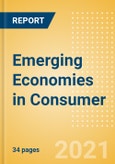There is not a strict definition of what an emerging economy is. However, emerging economies are characterized by a few common traits: they have low household incomes, structural changes occurring, reform programs and economic development that are under way, and stock and bond markets that are not matured. For the purpose of this report, the following countries are considered: Argentina, Brazil, Chile, China, Colombia, Egypt, Hungary, India, Indonesia, Iran, Malaysia, Mexico, the Philippines, Poland, Russia, Saudi Arabia, South Africa, Thailand, Turkey, and the United Arab Emirates (UAE). However, other emerging economies such as Singapore, South Korea, and Hong Kong are also analyzed.
Due to the COVID-19 pandemic, the complexion of emerging economies and all other countries has changed profoundly. The mid- and long-term priority of companies has changed to a short-term focus on survival and recovery from the effects of the pandemic in the established consumer goods markets. Nevertheless, attention will turn once again to emerging economies as a way to gain competitive advantage, please investors, and cover larger consumer audiences.
This thematic research report takes an in-depth look at the importance of the emerging economies as a macro theme driving the growth of companies in the consumer sector. It also touches on the influence of this theme on the retail and foodservice sectors, and it presents related consumer trends. An industry analysis is also present, highlighting a country analysis, mergers and acquisitions, and a timeline for this theme.
Due to the COVID-19 pandemic, the complexion of emerging economies and all other countries has changed profoundly. The mid- and long-term priority of companies has changed to a short-term focus on survival and recovery from the effects of the pandemic in the established consumer goods markets. Nevertheless, attention will turn once again to emerging economies as a way to gain competitive advantage, please investors, and cover larger consumer audiences.
This thematic research report takes an in-depth look at the importance of the emerging economies as a macro theme driving the growth of companies in the consumer sector. It also touches on the influence of this theme on the retail and foodservice sectors, and it presents related consumer trends. An industry analysis is also present, highlighting a country analysis, mergers and acquisitions, and a timeline for this theme.
Scope
- Emerging economies occupy a large percentage of the world population, resulting in an expanded labor force and consumer base, driving productivity and economic growth.
- the population across most of these emerging nations tends to be younger compared to the one in the developed markets. For example, 44% of India’s 2020 population is aged 24 or younger, whereas only almost 30% of UK’s population is 24 years old or younger. More educated people mean not only improved labor markets, therefore driving productivity and economic growth, but also an enhanced spending power.
- Rising income levels and living standards due to a shift in employment from agricultural sector to industrial and service sectors, as well as an emerging consumer middle class, will drive consumption demand and purchasing patterns. Real household consumption has increased in most emerging markets, growing particularly fast in China
- Emerging economies are improving their positioning in the World Bank’s ease of doing business rankings. Countries such as China, Egypt, India, Malaysia, Russia, Saudi Arabia, Turkey, Thailand, and UAE have made significant progress in simplifying processes for setting up businesses.
Reasons to Buy
- Understand the impact of the emerging economies theme on various industries, including FMCG, foodservice, and retail, using key trends and examples to help companies understand how they can adapt and understand this theme.
- Understand consumers’ trends that are impacting this theme, and rethink the business strategies accordingly.
- the publisher’s thematic research ecosystem is a single, integrated global research platform that provides an easy-to-use framework for tracking all themes across all companies in all sectors. It has a proven track record of identifying the important themes early, enabling companies to make the right investments ahead of the competition, and secure that all-important competitive advantage.
Table of Contents
Executive summaryThematic briefing
Trends
Industry analysis
Value chain
Companies
Glossary
Further reading
References
Our thematic research methodology
About The Publisher
Contact the Publisher
Companies Mentioned (Partial List)
A selection of companies mentioned in this report includes, but is not limited to:
- Asahi Group
- General Mills
- International Flavors and Fragrances
- Nestle
- Coca-Cola
- Unilever
- Bacardi








